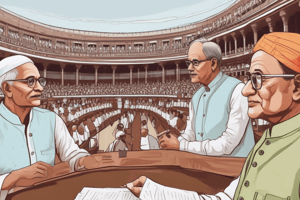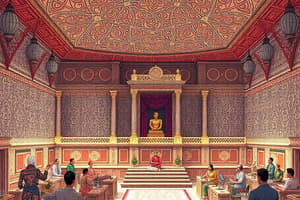Podcast
Questions and Answers
What power does the Rajya Sabha have regarding matters affecting the States?
What power does the Rajya Sabha have regarding matters affecting the States?
- It can remove any law passed by the State Legislature.
- It must approve any matter that the Union Parliament wishes to transfer from the State list. (correct)
- It can veto all proposals from the Union Parliament.
- It can directly enact laws for the States.
Which of the following statements best describes a function of the Rajya Sabha?
Which of the following statements best describes a function of the Rajya Sabha?
- It directly elects the Prime Minister of India.
- It can exercise control over the executive by asking questions. (correct)
- It has the power to approve state budgets directly.
- It initiates the impeachment process against the Supreme Court judges.
Which body is responsible for electing the President and Vice President of India?
Which body is responsible for electing the President and Vice President of India?
- The Lok Sabha
- The Electoral College (correct)
- The Supreme Court
- The Rajya Sabha
What is one of the special powers of the Rajya Sabha related to constitutional amendments?
What is one of the special powers of the Rajya Sabha related to constitutional amendments?
In which situation can the Rajya Sabha independently initiate the procedure for the removal of the Vice President?
In which situation can the Rajya Sabha independently initiate the procedure for the removal of the Vice President?
What is the primary function of the Parliament regarding legislation?
What is the primary function of the Parliament regarding legislation?
Which function of Parliament ensures that the executive remains accountable?
Which function of Parliament ensures that the executive remains accountable?
What role does the Cabinet play in the legislative process?
What role does the Cabinet play in the legislative process?
How can non-minister members influence legislation in Parliament?
How can non-minister members influence legislation in Parliament?
What aspect of government spending does the Parliament primarily oversee?
What aspect of government spending does the Parliament primarily oversee?
Study Notes
Functions of Parliament
- Legislative Function: Enacts laws; primarily introduces legislation drafted by bureaucracy under Cabinet supervision.
- Control of Executive: Ensures accountability and prevents overreach of authorities elected by the public.
- Financial Function: Manages government spending, approves taxation proposals, and examines budgets and financial amendments.
- Constitutional Amendments: Can amend the Constitution and initiate proceedings for the removal of key officials like the President and judges.
- Emergency Powers: Approves proclamations of emergency and special legislative measures for states.
Special Powers of Rajya Sabha
- Functions to represent states and protect state powers by reviewing matters affecting them.
- Any removal of subjects from the State List requires Rajya Sabha’s approval.
Importance of Legislature
- Acts as the center of democratic political processes, allows public representation and accountability of elected officials.
- Legislatures face challenges from increasingly dominant executives; however, they retain the power to hold governments accountable.
Instruments of Parliamentary Control
- Deliberation and Discussion: Ensures engagement in policy-making, scrutinizes government actions through forums like the Question Hour and Zero Hour.
- Financial Oversight: Legislative oversight on government finances and budgetary policies reinforces accountability.
- No-Confidence Motion: A key tool for accountability—recent history shows governments losing power due to lack of confidence in the Lok Sabha.
Challenges to Legislative Function
- There has been a trend of reduced parliamentary sessions and debates, indicating a decline in legislative oversight.
- Absences and boycotts by opposition members hinder parliamentary effectiveness in control.
Additional Notes
- Successful parliamentary control requires member participation, adequate session times, and agreements between the government and opposition.
- The ability of the legislature to control and guide executive action is crucial for maintaining a responsive government.
Studying That Suits You
Use AI to generate personalized quizzes and flashcards to suit your learning preferences.
Related Documents
Description
Test your understanding of the Indian legislature with this quiz focused on Chapter 5. Explore the implications of the Rajya Sabha's composition and its role in representing the states of India. Consider the advantages and disadvantages of indirect versus direct elections.




